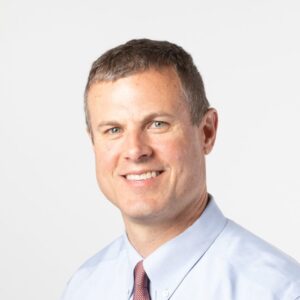Meet Our New Board Chair, Bryce Hach
Written by Bryce Hach, Chair of the Population Connection Board of Directors | Published: September 11, 2023

Bryce Hach was born in Iowa and grew up in Colorado. After graduating from Colorado College in 1998, Bryce became a public high school science teacher and football coach in the Mississippi Delta with Teach for America. Afterward, Bryce completed the Coro Fellows Program in public policy leadership in St. Louis and then an MS in public policy management from Carnegie Mellon University.
In 2004, Bryce moved back to Colorado and became the Executive Director of a private foundation that supports current and future high school chemistry teachers nationwide. Later, Bryce took on the role of Executive Director of a multi-sector collaborative effort to reduce homelessness in Fort Collins.
In 2013, Bryce and his family made an intentional move to Falmouth, Maine. Bryce worked in director roles for nonprofits in social service and environmental conservation while serving on several boards and teaching graduate courses in nonprofit and public management at the University of Southern Maine’s Muskie School. In 2018, Bryce and his wife, Sarah, started a business called Maine Food for Thought, an educational food tour focused on locally and sustainably sourced food, which had a great run until Covid-19 forced the business to close.
At that point, Bryce returned to teaching, his first profession. He teaches biology, AP environmental science, and systems thinking at North Yarmouth Academy in Yarmouth, Maine. Bryce is also a Science Ambassador Fellow with the Centers for Diseases Control (CDC), a certified Maine Master Naturalist, and a new member of the Falmouth, Maine, Town Council.
Bryce, Sarah, and their daughter, Ivy, enjoy the outdoors, sports, movies, travel, food, and engaging in conversations around just about any topic.
Bryce joined the Population Connection Board of Directors in 2018, serving as the Secretary and then the Vice Chair before being elected to Chair in June of this year. Below, he shares his hopes for our planet and its future.
Board Chair’s Note
The human population has doubled in my lifetime, and during that same period, over two-thirds of the planet’s wildlife has been lost. When I was born, climate change was not on our collective radar. When I was born, there weren’t massive gyres of plastic swirling in three of the world’s five oceans. When I was born, there wasn’t coral bleaching. When I was born, the Amazon Rainforest was much larger than it is now. But, again, when I was born, the size of the human population was half what it is today.
However, what if? What if our planet was ecologically secure? What if the natural world could thrive alongside our own species? What if we could go to bed at night knowing Earth was going to be all right? For us, for our children, for children born long after we are gone.
Let’s imagine this hypothetical future world. We are smaller in number now. Cities still hum along with energy, innovation, creativity, culture, museums, libraries, and sports, but they don’t sprawl out as far as they once did. They are a little quieter now, and a little darker at night. On a clear night, stars present themselves above the city lights. Traffic congestion is lighter now too, and the smog has dissipated. Old infrastructure that is no longer needed has been converted into parks, woods, affordable housing, small urban family farms, and other creative uses.
Sea levels have dropped as glacial ice in the polar regions has come back. Fish populations are healthy again, and solutions for removing plastic from the oceans are being implemented.
Neighborhoods are more intimate and walkable now, and neighbors are more neighborly. As we travel outward from city centers, past industrial, commercial, mixed-use, and residential neighborhoods, we come upon farms, where livestock and crops are nurtured in ecological connection with one another. Major monoculture industrial scale farms and giant feedlots have given way to smaller, more diverse farms that preserve topsoil, pollute less, and treat livestock humanely.
Past the farms, we reach the edge of development. Unbroken forests and grasslands provide ample habitat for wildlife to safely range. Rivers flood in the spring and recede in the summer in the absence of dikes and levees. Nature is no longer confined to publicly funded parks, walled reserves, and zoos; it has reclaimed most of the planet and supports millions upon millions of thriving species, including our own.
With your generous support, Population Connection is working toward a future for people and the planet that is safe, healthy, and sustainable for all. Thank you for your steadfast dedication to population stabilization—it’s an honor to work alongside you for positive, lasting change.
–Bryce
